Misyon Online - January-February 2015
PULONG NG EDITOR
Pulong ng Editor
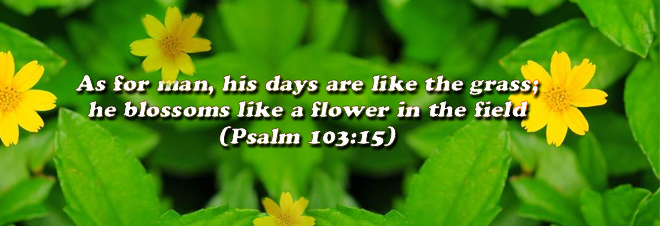
For the Beauty of the Earth, arranged by John Rutter.
Your editor is not the most organized person in the world. But often enough, from the ‘disorder’ that this causes, things come together in an unexpected but orderly way. The editorial staff suggested a photo by Benjo Rullena for our January-February cover and your editor found an appropriate verse from Psalm 103: As for man, his days are like the grass; he blossoms like a flower in the field.
Read story...

A JOURNEY ‘UP’ MEMORY LANE
By Fr Patrick Colgan
Fr Pat Colgan, from Northern Ireland, was based in Fiji before being elected to the General Council of the Missionary Society of St Columban. The Council members live in Hong Kong.
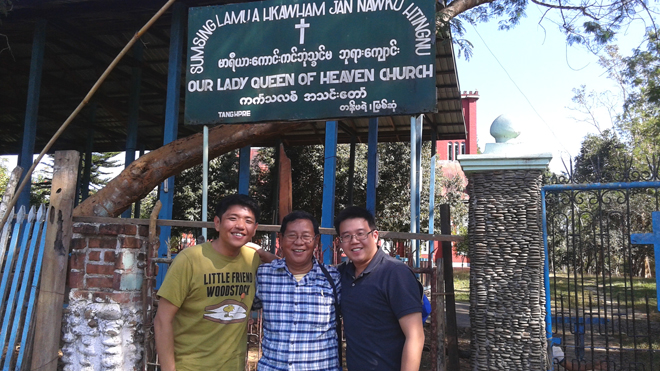
Fr Jehoon Lee, Bishop Francis Daw Tang, Fr Carlo Jung at Our Lady Queen of Heaven Church, Tanghpre
As part of the first visit to Myanmar (Burma) by two newly-ordained Korean Columban priests in November 2014, Frs Carlo Jung and Jehoon Lee, who will be assigned there this year, the Bishop Francis Daw Tang of Myitkyina was anxious to take us, accompanied by some Columban Sisters and a lay associate from Hong Kong, to one of the sites of the original Columban mission among the Kachin people. We drove about 45 kms north to Tanghpre, a scenic spot where the Mali and Nmai rivers form the ‘Confluence’ of the famous Irrawaddy River.
Read story...

BECAUSE WE ARE STUDENTS FOR LIFE
by Richelle H. Verdeprado
Teakare Betero, from Raba, Fiji, is undergoing his Spiritual Formation Year in Quezon City. Richelle H. Verdeprado is the Editorial Assistant of MISYONonline.com.
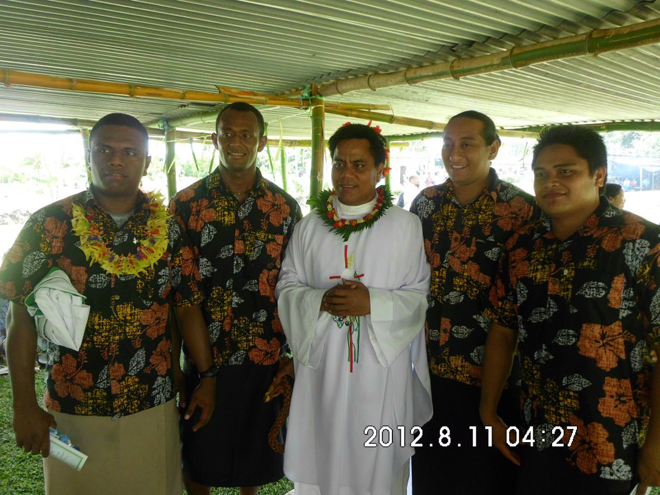
Teakare (far right) with Fr Taaremon Matauea on
the latter’s ordination day, 11 August 2013.
Every time he attended Mass during his teenage years, Teakare Betero or ‘Tex’ would recite with the priest instead of responding to him. For reasons he could not really tell at the time, he just got used to doing that. He grew up that way and his friends would even jokingly say to him that he might become a priest someday. Never did he think too that he would decide to take a journey towards priesthood and that a day would come when he would feel so hungry to learn more about God.
Read story...

THE JUBILEE YEAR OF ST COLUMBAN BEGINS IN ROME
Filipina Columban Lay Missionary Rose Basada shares with us her participation in the three-day celebration in Rome marking the opening of the Jubilee Year of St Columban, which runs from 10 October 2014 to 23 November 2015. This year makes the 1400th anniversary of the death of St Columban in the year 615 in the northern Italian town of Bobbio. Rose is based in Birmingham, England.
It was a blessing and privilege for me to participate in the celebrations in Rome to open the Jubilee Year of St Columban, the patron of the Missionary Society of St Columban with whose members we Columban Lay Missionaries work on mission.

Rose, center, waving to Pope Francis
The Jubilee Year began with four major events. They started on 10 October with Ecumenical Vespers at 5:00pm in the Basilica of San Clemente. The church was full of pilgrims from different places in Europe. It was a very moving celebration as people of many cultures and Christian denominations gathered. I was able to meet pilgrims from various churches – Catholic, Anglican and Methodist. The Parish Priest of Bobbio held relics of St Columban during the procession. They are normally kept at the Museum in Bobbio where Columban died in AD 615.
Read story...

OUR HIDEAWAY
How This Year is Going to be Depends On You
By Jessan M. Cabunsol
Jessan is a third year BS Civil Engineering student at the University of Negros Occidental -Recoletos. Presently, he is also the editor-in-chief of the Tolentine Star, the official student publication of the university. Jessan is an active Kwaderno volunteer too.
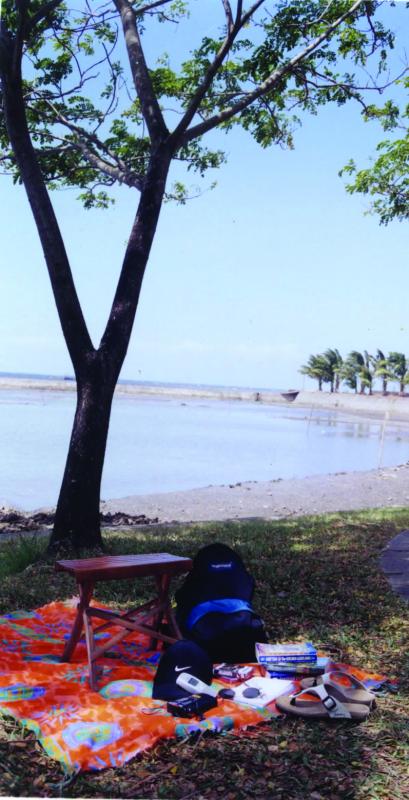 It is one of the most awaited holidays around the globe. This is the time for change – new hope, new life, new styles, new look, and everything that needs to be renewed. This holiday is New Year’s Day.
It is one of the most awaited holidays around the globe. This is the time for change – new hope, new life, new styles, new look, and everything that needs to be renewed. This holiday is New Year’s Day.
Aside from Christmas, New Year is one of the most celebrated holidays all over the world. For thousands of years people have been celebrating the good life, hope, and everything about goodness at the beginning of every year.
Read story...
I’m Ready for You, 2015
Marla Grace Halili, 23 years old, works as a Customer Service Representative in Bacolod City. Here, she shares the essential lessons she learned last year and how she is facing 2015.

Read story...

PEACE BY PEACE


Pope Francis in Brazil during World Youth Day 2013 [Wikipedia]
‘I think also of the living conditions of many migrants who, in their dramatic odyssey, experience hunger, are deprived of freedom, robbed of their possessions, or undergo physical and sexual abuse. In a particular way, I think of those among them who, upon arriving at their destination after a gruelling journey marked by fear and insecurity, are detained in at times inhumane conditions. I think of those among them, who for different social, political and economic reasons, are forced to live clandestinely. My thoughts also turn to those who, in order to remain within the law, agree to disgraceful living and working conditions, especially in those cases where the laws of a nation create or permit a structural dependency of migrant workers on their employers, as, for example, when the legality of their residency is made dependent on their labour contract. Yes, I am thinking of “slave labour”.’
- Pope Francis, Message for World Day of Peace, 1 January 2015.
Read story...

Pulong ng Editor
Pulong ng Editor

For the Beauty of the Earth, arranged by John Rutter.
Your editor is not the most organized person in the world. But often enough, from the ‘disorder’ that this causes, things come together in an unexpected but orderly way. The editorial staff suggested a photo by Benjo Rulona for our January-February cover and your editor found an appropriate verse from Psalm 103: As for man, his days are like the grass; he blossoms like a flower in the field.
Not finding any inspiration for this column, your editor stumbled across the video above of For the Beauty of the Earth in an arrangement by contemporary English composer John Rutter. It seemed to tie in with the cover photo and verse.
And in the First Reading for the Feast of the Baptism of the Lord, this year on 11 January, includes these beautiful verses from Isaiah that draw on nature to show us something of God’s love:
Yet just as from the heavens
the rain and snow come down
And do not return there
till they have watered the earth,
making it fertile and fruitful,
Giving seed to the one who sows
and bread to the one who eats,
So shall my word be
that goes forth from my mouth;
It shall not return to me empty,
but shall do what pleases me,
achieving the end for which I sent it. (Is 55:10-11, NABRE).
It is impossible for God’s word not to bear fruit, just as it is impossible for seeds that get the proper amount of rain and sunshine not to grow, unless we reject it. The Prophet Isaiah speaks of the word that goes forth from my mount but St John in the magnificent opening to his Gospel tells us Who the Word is:
And the Word became flesh
and made his dwelling among us,
and we saw his glory,
the glory as of the Father’s only Son,
full of grace and truth (John 1:14).
Jesus, the Word who became flesh, often drew his listeners closer to God by drawing their attention to aspects of God’s creation.
The Book of Genesis shows us how everything that God has created is inter-related and how all creatures give glory to him by being what they are. And we humans, created by God in his image, unlike any other creature, have a particular responsibility towards everything that God has made. And we whom God has gifted with faith have a responsibility to make the Word made flesh known to every other human being as a matter of urgency.
Pope Francis in Evangelii Gaudium, The Joy of the Gospel (No 259) tells us that Spirit-filled evangelizers means evangelizer fearlessly open to the working of the Holy Spirit . . . Jesus wants evangelizers who proclaim the good news not only with words, but above all by a life transfigured by God’s presence.
The Holy Spirit gives some the gift of creating order and some the gift of finding order in ‘disorder’. The latter could not use their gift without the former using theirs and God calls each of us not only to rejoice in and use the particular gifts he has given us but to rejoice in gifts that others have that we don’t have; to rejoice in the fact that the gifts of others enable us to use ours and our gifts enable them to sue theirs.
In the words of American songwriter Bill Staines, All God’s Creatures Got a Place in the Choir.
A Journey ‘Up’ Memory Lane
By Fr Patrick Colgan
Fr Pat Colgan, from Northern Ireland, was based in Fiji before being elected to the General Council of the Missionary Society of St Columban. The Council members live in Hong Kong.

Fr Jehoon Lee, Bishop Francis Daw Tang, Fr Carlo Jung
at Our Lady Queen of Heaven Church, Tanghpre
As part of the first visit to Myanmar (Burma) by two newly-ordained Korean Columban priests in November 2014, Frs Carlo Jung and Jehoon Lee, who will be assigned there this year, the Bishop Francis Daw Tang of Myitkyina was anxious to take us, accompanied by some Columban Sisters and a lay associate from Hong Kong, to one of the sites of the original Columban mission among the Kachin people. We drove about 45 kms north to Tanghpre, a scenic spot where the Mali and Nmai rivers form the ‘Confluence’; of the famous Irrawaddy River.
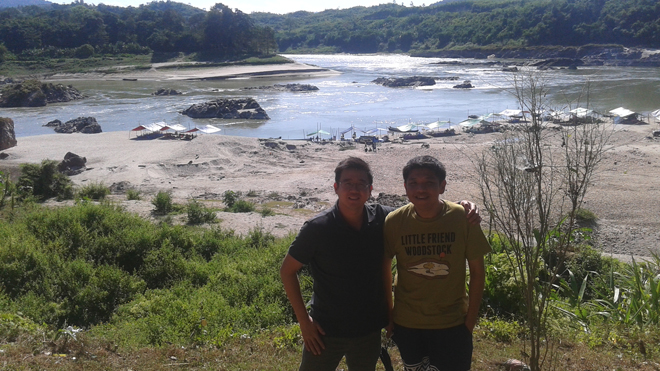
Frs Carlo and Jehoon at the confluence of the Irrawaddy
I quote the following from a Far East article of January 1962 of Fr Lawrence McMahon, a Columban from Chicago who worked in Burma from 1938 till 1972: ‘Tanghpre is a powerhouse of Columban activity. Fr Bernard Way from Melbourne runs not only a Catechists training school but also the Catholic printing press. The press, like Fr Way, is never idle. From it flows a monthly paper, the Jinghpaw Kasa (“Kachin Messenger”) plus a constant stream of Catholic books and pamphlets. The press gets it power from a diesel generator; none of us has ever been able to figure out where Fr Way gets his energy! Like all our parishes here, Tanghpre is vast and includes a mountainous district called “Pungyin Dung” which is every bit as formidable as its name suggests; some mountain tracts here are so deep that even the Kachins call them “steep ascents that make the children cry”...’
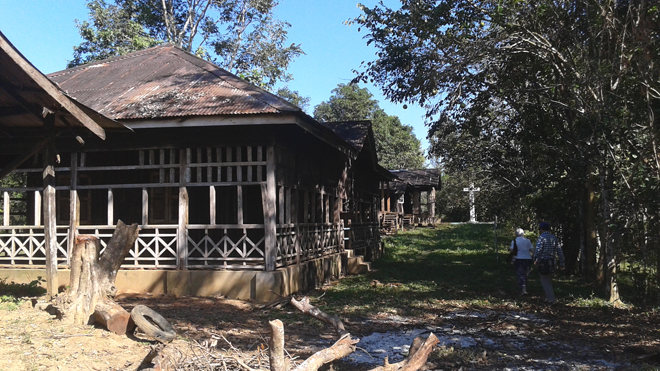
Old church compound, Tanghpre
What struck me looking at the buildings – priest’s house, church, boarding school and printing press - all dating from the late 1930s when Columbans moved there - was how well the wood and bamboo structures had survived, but also the tragedy of their present abandonment, and that of the whole village, due to the very real possibility of the whole area being flooded due to the Myitsone Dam, a project in which China has already invested heavily, but that has been put on hold due to relentless pressure on the Myanmar government by both locals and NGOs who rightly see what devastation it would bring to the whole of the Kachin State. Many villagers have already relocated to ‘new villages’ down valley, built by the Chinese company, complete with school, church and Marian grotto! But this is nothing compared to the ecological catastrophe that would ensue if the Myanmar government eventually caves in. Over 90 percent of the electricity produced will be going to nearby Yunnan Province, People’s Republic of China.
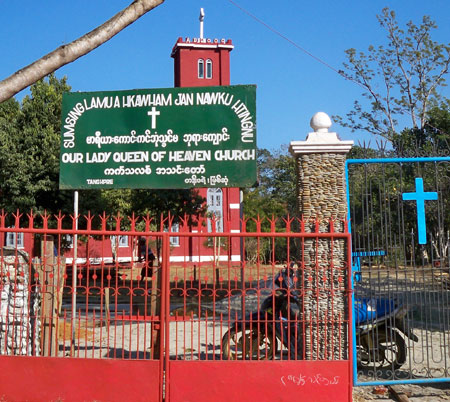
Our Lady Queen of Heaven Catholic Church in Tanghpre, built by Columbans [Kachin News Group]
So this explains the empty mission in Tanghpre; most poignant, perhaps, is the fact that the original Columban priests’ rooms have been left completely intact, with books, wall pictures and even an internal coal oven/heater all slowly crumbling. I had a real sense that, at least in spirit, these brave Columbans, are still there with their people, and through their artifacts at least, ‘refusing to move’ in the face of big business.

The Irrawaddy River at Myitkyina [Wikipedia]
We heard the stories of many other Columbans on our way back to Myitkyina, the fidelity to their people – Fr Thomas Walsh, dying from malaria at 34 in December 1945, Fr John Walsh, 43, shot through the head and found in a shallow grave in March 1964; Fr Thomas McEvoy, 56, collapsing and dying on Christmas Eve 1969 while climbing to another village to celebrate Christmas Mass. With such a foundation, this new chapter in our walk with the Kachins, will bring its own joys and tears, as together we join their long struggle for the dignity and the rights they believe that God, if not yet the Myanmar government, wills them to have.
Myitkyina – My Home Town (St Columban’s Cathedral at 2:14 and 2:20; Diocesan Centre at 2:31)
Because We are Students for Life
by Richelle H. Verdeprado
Teakare Betero, from Raba, Fiji, is undergoing his Spiritual Formation Year in Quezon City. Richelle H. Verdeprado is the Editorial Assistant of MISYONonline.com.

Teakare (far right) with Fr Taaremon Matauea on the latter’s ordination day, 11 August 2013
Every time he attended Mass during his teenage years, Teakare Betero or ‘Tex’ would recite with the priest instead of responding to him. For reasons he could not really tell at the time, he just got used to doing that. He grew up that way and his friends would even jokingly say to him that he might become a priest someday. Never did he think too that he would decide to take a journey towards priesthood and that a day would come when he would feel so hungry to learn more about God.
27-year-old Tex grew up in Rabi, Fiji. He entered the Columban Seminary four years ago. Fr Donal Mellraith used to visit Rabi at Christmas. He didn’t know that Father Donal was a Columban priest but he was struck and fascinated by how an Irish priest could celebrate Mass in their local language. Though he just saw him sometimes, he did not forget Father Donal. When his cousins asked him if he liked the idea of becoming a priest, he agreed with much excitement but he would want to enter the same congregation as that of Father Donal. He just remembered about him and that’s the reason why he found the Columbans. His parents and his nine siblings were supportive of the idea too.
He went to Nasese, Suva, in Fiji and there he met Fr. Ioane Gukibau, one of the formators and a Fijian. He started getting to know the Columbans more and admired their willingness to be with people in various aspects of their lives. They had really learned the language and the culture. For him, their involvement in the social life of people is the most significant experience because it is from it and through it that God’s presence can be concretely felt. Columbans just find themselves at home wherever they are and that is something that made Tex committed to do his share in spreading that concept of home and of being family to one another. Tex shared how happy he is because he feels at home though he is in a foreign land now for his spiritual year.
He sees Filipinos as friendly and devoted. Before leaving Fiji, he was told about the Philippines but the actual experience is really different. He realized that when you are in the field, learning becomes even deeper and more life-changing. One will understand more if one will really engage and interact with the people. He also finds oneness despite diversity as he sees some aspects of Fiji in the Philippines too. We can never be totally different and this should unite us.

Quirino Avenue, Manila [Wikipedia]
But one thing Tex finds challenging is the traffic in Manila. At first, he was irritated but as he got more used to it, he turned it into an opportunity to be more patient and reflective. Tex said that he is continually being inspired by what Columbans have been doing in the Church and in the community. He added that the overall program of the Columbans really keeps him going. He furthermore added, ‘Though being still a student, you can already have some taste of how it is to be a missionary. Thus, you are already being changed for the better.’
Indeed, every day is an opportunity to learn. In life, we grow more when we have the humility and enthusiasm to keep on learning. We are forever students of life, and the result of each test becomes positive and victorious, when we do everything with God in our minds and hearts.
Rabi, Fiji
Presentation of Gifts at ordination Mass of Fr Taaremon Matauea in Rabi
Teakare Betero is from Rabi (‘rambi’), an island in the northern part of Fiji, with a population of about 5,000 and a land area of 66/3 square kms. His father was the late Betero toma, who was from Kiribati (‘kiribas’), independent from the United Kingdom since 1979, nine years after Fiji became independent.
The parents of Teakare’s mother, Kaitinano Tanikatare, were brought from Banaba, an island that is part of what is now Kiribati, on 15 November 1945 along with the ancestors of the current population of Rabi. The people or Rabi are represented in the parliaments of both Fiji and Kiribati.
Columban Fr Taaremon Matauea, ordinaed in 2012 and now based in Taiwan, is also from Rabi.
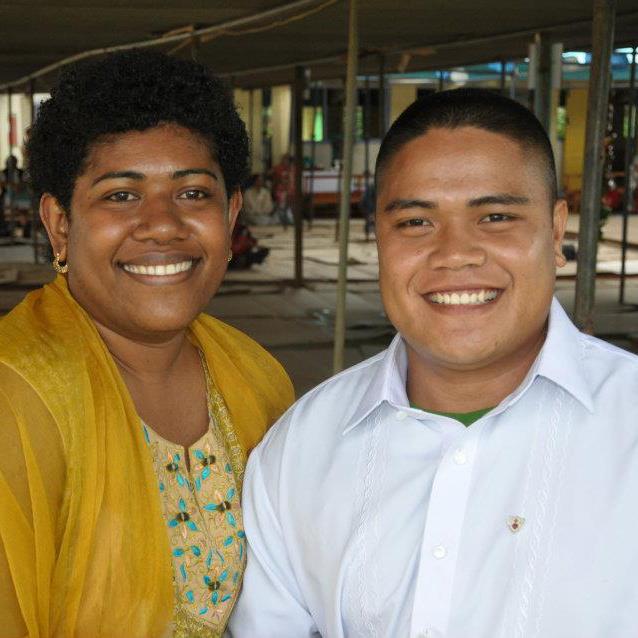
Teakare, right , With Lanieta Tamatawale, a Fijian Columban Lay Missionary, formerly based in the Philippines and now in Suva, Fiji.
Ron Sigrah, a businessman from Rabi and a neighbour of Teakare, speaks about the uses of the coconut.
The Jubilee Year of St Columban begins in Rome
Filipina Columban Lay Missionary Rose Basada shares with us her participation in the three-day celebration in Rome marking the opening of the Jubilee Year of St Columban, which runs from 10 October 2014 to 23 November 2015. This year makes the 1400th anniversary of the death of St Columban in the year 615 in the northern Italian town of Bobbio. Rose is based in Birmingham, England.
It was a blessing and privilege for me to participate in the celebrations in Rome to open the Jubilee Year of St Columban, the patron of the Missionary Society of St Columban with whose members we Columban Lay Missionaries work on mission.

Rose, center, waving to Pope Francis
The Jubilee Year began with four major events. They started on 10 October with Ecumenical Vespers at 5:00pm in the Basilica of San Clemente. The church was full of pilgrims from different places in Europe. It was a very moving celebration as people of many cultures and Christian denominations gathered. I was able to meet pilgrims from various churches – Catholic, Anglican and Methodist. The Parish Priest of Bobbio held relics of St Columban during the procession. They are normally kept at the Museum in Bobbio where Columban died in AD 615.
After the Ecumenical Vespers we walked towards the Basilica of Santa Maria Sopra Minerva. There we listened with fellow pilgrims to ‘The Priests’ in concert to raise money for St Elizabeth Hospital, Hyderabad, Pakistan, which has strong links with the Missionary Society of St Columban.
The Priests, Armagh Cathedral, Ireland
On the second day – 11 October - we gathered at the Basilica of St John Lateran where there was a liturgical welcome of the relics of St Columban and a Solemn concelebrated Mass with Cardinal Agostino Vallini, Vicar General of the Diocese of Rome. There were thousands of pilgrims at this event and many priests and bishops. I was very blessed to be able to read one of the Prayers of the Faithful at this Mass. It was very important to me to be able to contribute and pray for peace and interreligious dialogue, something I know is so important in my work as a missionary and in the world today.
I was amazed at how devoted so many pilgrims were to St Columban. Many had traveled from Germany, France, Austria, Switzerland and Ireland and from the Italian cities of Bobbio and Florence. Each group carried a banner with the image of St Columban. I'm happy I got the chance to walk and make friends with other pilgrims. I felt humbled and inspired by their patience and perseverance in joining the pilgrimage as I saw many of them walk a long way from one church to another. This trip was very important for me as a Columban Lay Missionary as it helped me deepen my understanding about the patron saint of Columban missionaries.
On the third day there was a solemn concelebrated Mass in honor of St Columban. The main celebrant was Ireland’s Cardinal Seán Brady, Archbishop Emeritus of Armagh, at the Basilica of Santa Maria Sopra Minerva. It was the only homily I understood because at other Masses the celebrants spoke Italian.His homily was very informative and encouraging. It continues to gives me inspiration to keep going in my missionary journey.
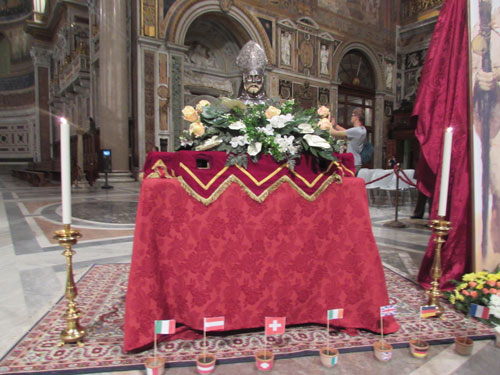
Relics of St Columban, St John Lateran
All the more, it gave everyone more information about who St Columban was. Indeed his memory lives on in the life of the parishioners of Bobbio and many parishes in Italy and other places around the world today.
We ended our pilgrimage by attending the Sunday Angelus with Pope Francis in St Peter’s Square. It felt like a very personal welcome even though we were surrounded by thousands of people. Pope Francis himself was so welcoming and greeted the Columban Pilgrimage. It was a blessing to see the Pope and be able to pray with him, with other pilgrims, and with my fellow Columbans.
his article appeared in the November-December 2014 issue of The Far East, the magazine of the Columbans in Australia and New Zealand.
Our Hideaway
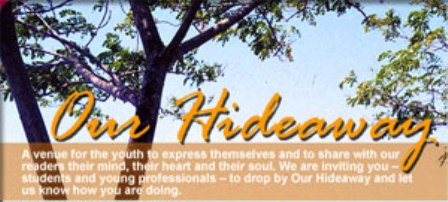
How This Year is Going to be Depends On You
By Jessan M. Cabunsol
Jessan is a third year BS Civil Engineering student at the University of Negros Occidental -Recoletos. Presently, he is also the editor-in-chief of the Tolentine Star, the official student publication of the university. Jessan is an active Kwaderno volunteer too.
 It is one of the most awaited holidays around the globe. This is the time for change – new hope, new life, new styles, new look, and everything that needs to be renewed. This holiday is New Year’s Day.
It is one of the most awaited holidays around the globe. This is the time for change – new hope, new life, new styles, new look, and everything that needs to be renewed. This holiday is New Year’s Day.
Aside from Christmas, New Year is one of the most celebrated holidays all over the world. For thousands of years people have been celebrating the good life, hope, and everything about goodness at the beginning of every year.
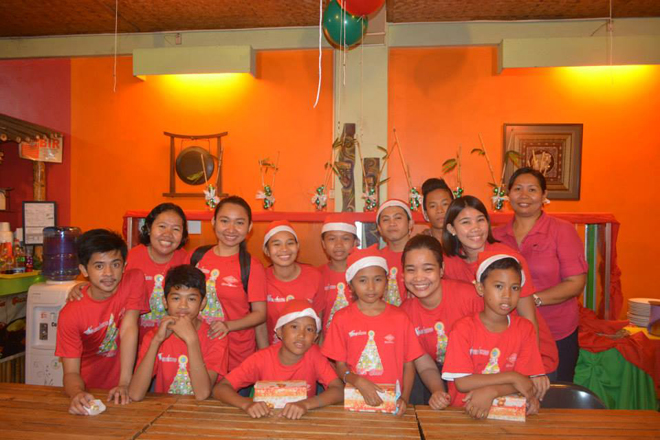
For some, this time of year is a new beginning. Despite calamities, unexpected tough things, and whatever challenges – easy and difficult – the New Year gives us the strength and hope to become more positive. It may be difficult to ‘wrap up’ 2014 and to be ungrateful because of the events that happened: another super typhoon hit the Philippines, the Ebola virus killed thousands of people, and the weeks of war between Israel and Gaza, among other things. However, those challenges have shown the care and love of humans for each other.
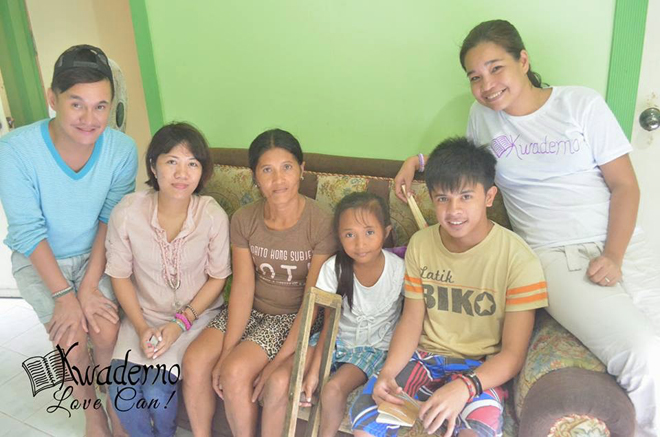
Last year I was blessed to be part of an organization called Kwaderno Love Can Inc. There I met one of their scholars, Angelica Enario. This twelve-year-old girl has faced life’s challenges with positivity. She is presently a Grade 5 pupil in Sangke, Hinoba-an, the last barangay in the southernmost part of Negros Occidental. Angelica has been a consistent First Honor pupil since Grade 1. You might think that anybody could become like Angelica. Yes, anyone could. But, what’s amazing with Angelica is that she knows her path despite being a child with a disability – a child born with only one foot. Whatever imperfections we have, it is still up to decide how we are going to live our lives. Being a person with a disability will just make one unique, but not different from others. For Angelica, impossibility has no room in her life. It is just a matter of will and determination. And she believes that being optimistic is her way of reaching her dreams in spite of what has God has given her.
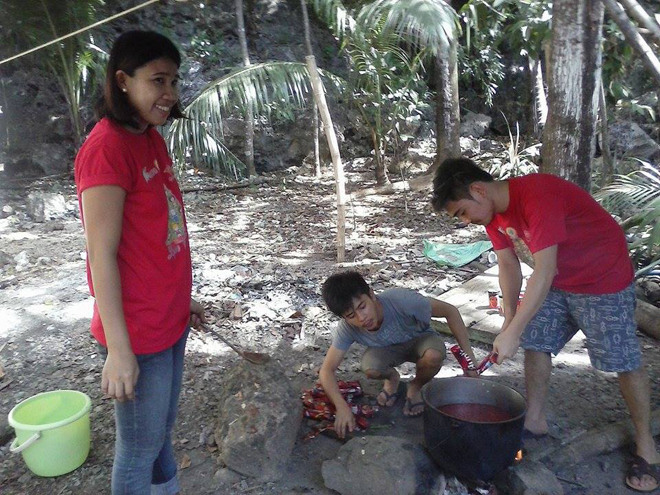
I am now a ‘fan’ of Angelica and children who understand life as a challenge. Thanks to her for sharing her own story of positivity and willingness.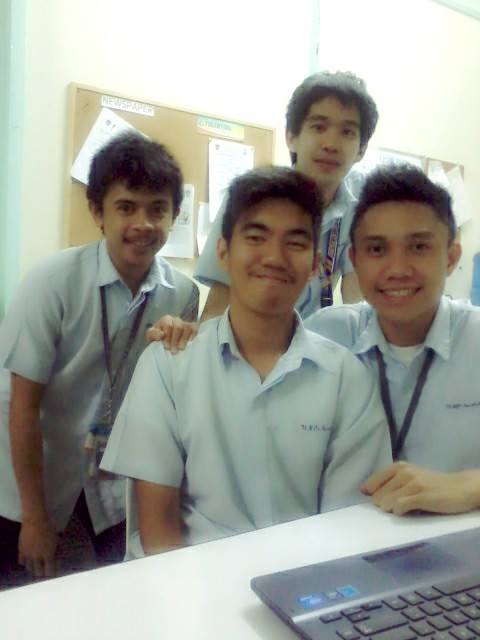 Thanks to the Kwaderno team for being an unexpected blessing from above. I may not be that expressive but my every word and little smiles really mean a lot to others. I never saw this coming. My life now is anchored with love, happiness, and positivity, and I am even seeing my future still volunteering with Kwaderno. I know that my succeeding years will be filled with many lessons and will have an impact because my whole has already been rooted in what we are working for in Kwaderno.
Thanks to the Kwaderno team for being an unexpected blessing from above. I may not be that expressive but my every word and little smiles really mean a lot to others. I never saw this coming. My life now is anchored with love, happiness, and positivity, and I am even seeing my future still volunteering with Kwaderno. I know that my succeeding years will be filled with many lessons and will have an impact because my whole has already been rooted in what we are working for in Kwaderno.
This New Year depends on all of us. Let’s accept the fact that it would be very hard to make it wonderful and meaningful altogether. But that doesn’t mean that it is difficult to bring about a better and more positive world. We, the people around the world, might not do it altogether yet each of us can start doing our own year wonderful and meaningful in a positive a way.
Fortunate are we that we still have the chance to make our lives better or even best. Enough making and repeating the same New Year’s resolutions we have made over and over again. The hope and positivity the New Year brings to us will only be useful if we take action.
Peace By Peace


Pope Francis in Brazil during World Youth Day 2013[Wikipedia]
‘I think also of the living conditions of many migrants who, in their dramatic odyssey, experience hunger, are deprived of freedom, robbed of their possessions, or undergo physical and sexual abuse. In a particular way, I think of those among them who, upon arriving at their destination after a gruelling journey marked by fear and insecurity, are detained in at times inhumane conditions. I think of those among them, who for different social, political and economic reasons, are forced to live clandestinely. My thoughts also turn to those who, in order to remain within the law, agree to disgraceful living and working conditions, especially in those cases where the laws of a nation create or permit a structural dependency of migrant workers on their employers, as, for example, when the legality of their residency is made dependent on their labour contract. Yes, I am thinking of “slave labour”.’
- Pope Francis, Message for World Day of Peace, 1 January 2015.

‘The time has come to promote policies which create employment, but above all there is a need to restore dignity to labour by ensuring proper working conditions. This implies, on the one hand, finding new ways of joining market flexibility with the need for stability and security on the part of workers; these are indispensable for their human development. It also implies favouring a suitable social context geared not to the exploitation of persons, but to ensuring, precisely through labour, their ability to create a family and educate their children...’
- Pope Francis, Speech to the European Parliament, 25 November 2014.
The full text of the Pope’s speech is here.

St John Paul II,
Homily, Chicago, 5 October 1979
‘To maintain a joyful family requires much from both the parents and the children. Each member of the family has to become, in a special way, the servant of the others…’
-St John Paul II, Homily, Washington DC, 7 October 1979.

‘What does love look like? It has the hands to help others. It has the feet to hasten to the poor and needy. It has eyes to see misery and want. It has the ears to hear the sighs and sorrows of men. That is what love looks like.’
- St Augustine of Hippo

‘The greatest disease in the West today is not TB or leprosy; it is being unwanted, unloved, and uncared for. We can cure physical diseases with medicine, but the only cure for loneliness, despair, and hopelessness is love. There are many in the world who are dying for a piece of bread but there are many more dying for a little love. The poverty in the West is a different kind of poverty -- it is not only a poverty of loneliness but also of spirituality. There's a hunger for love, as there is a hunger for God.’
― Blessed Teresa of Calcutta, A Simple Path: Mother Teresa

Experience proves that in this life peace and satisfaction are had, not by the listless but by those who are fervent in God's service. And rightly so. For in their effort to overcome themselves and to rid themselves of self-love, they rid themselves of the roots of all passion and unrest.
I’m Ready for You, 2015
by Marla Halili
Marla Grace Halili, 23 years old, works as a Customer Service Representative in Bacolod City. Here, she shares the essential lessons she learned last year and how she is facing 2015.

365 days over. Can you believe that? Days pass by like a blink of an eye and here we go again. Another year full of possibilities. Each year we have these goals to accomplish, but by the end of the year, out of all those things what have we accomplished? That’s why I’m not fond of making such promises because we don’t know what’s in store for us in the upcoming days. I’m not saying that we should stop making plans but that we should have an ‘ACTION’ plan.
So before we bid farewell to 2014 and put those plans into action let’s do some backtracking on what we have learned for us to bring to the upcoming days. As for me, 2014 was quite a ride, with its fair share of ups and downs and some downfalls. From all of this I’ve learned four essential things: acceptance, forgiveness, kindness and love.
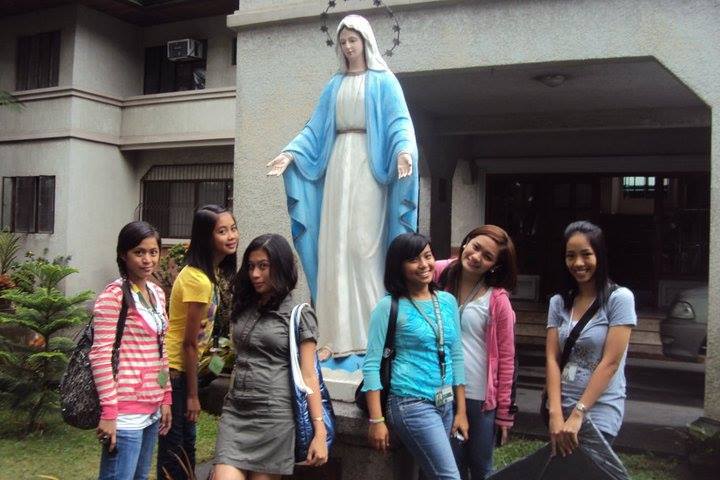
Acceptance. Things may go according to your plans and if it doesn’t you’ll get hurt and think that things will work out fine. Thinking that you’re just being hopeful but you’re not, you’re in a state of denial. The day when my grandmother died was a wake-up call, I was hoping that her death was some kind of nightmare or that she was just sleeping. I’m the emotional type but for the first time I couldn’t cry and if people asked if I was okay I simply said ‘I don’t know’. The day that I feared most came, that of her funeral. The night before that I thought I heard her voice calling my name and at that moment I felt that she was trying to tell me to move on and accept the fact that she was in a better place now. I’ve learned that it takes a little maturity to accept that things doesn’t go your way, that everything happens for a reason and that it’s always for the better.
Forgiveness. Forgetting is different from forgiving. You may try to forget to ease the pain but you know for a fact that it is still there: ‘sleeping’, waiting to be awakened. Forgiveness means letting go of the pain and healing yourself from the scar of ‘before’. Yes! It will take time - give time, time.
Kindness. Giving someone that awkward smile doesn’t mean you’re kind. Kindness is respect. Respecting others as persons, for who they are or what they are. Their life is not yours to live.
Love. One of the most valuable lessons of my 2014 is understanding the meaning of those four-letter word that can make or break you. Through my heartaches I’ve come to realize that love begins in yourself: that you must love yourself first and accept your individuality. You know what they say: ‘You cannot give what you don’t have’. For me love is giving and giving You just give without expecting anything in return and that’s the beauty of loving, you become selfless.
I will be bringing these lessons to improve myself. So let me end this by saying, ‘Thank you, 2014, for the lessons learned’ and ‘Hi there, 2015! I think I’m ready for you.’